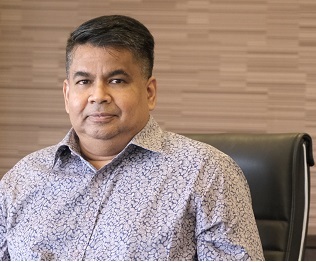- Meticulously addresses criticisms by EMIR Research about DNB’s 5G rollout
- Argue’s proposals would lead to wholesale costs beetween 4 to 5 times higher
Digital Nasional Bhd-hired telco consultants, Plum Consultancy from the UK, has meticulously disputed criticisms that DNB’s current 5G single wholesale network (SWN) rollout in Malaysia will result in mobile operators being unable to compete in terms of service innovation.
The consultancy was responding to contentions made by EMIR Research, an independent think-tank focused on strategic policy recommendations, whose current president and CEO is Dr. Rais Hussin Mohamed Ariff (pic), the former chairman of MDEC and a seasoned entrepreneur who has run a broadband company as well in the mid 2000s. 
In a detailed response, Plum has baldly stated in its report that “EMIR has demonstrated that it does not understand how the SWN works”, and argues that EMIR’s proposal would lead to wholesale costs that are 4 to 5 times higher than those of the SWN.
[Ed: Readers can download the full, 4,700 word rebuttal by Plum Consultancy here.]
In particular, Plum estimates that moving from 4G to 5G using the SWN model lowers wholesale costs per GB of mobile data by around 85% (based on the prices in DNB’s reference access offer and MCMC’s estimates of the cost of expanding 4G capacity).
The Kuala Lumpur-based EMIR had originally proposed that DNB’s 5G SWN be abandoned and 5G spectrum be reassigned to the six Malaysian mobile operators for them to build individual 5G networks. DNB should then be repurposed to build passive infrastructure (such as towers and fiber transmission links) in the rural areas, allowing mobile operators to use this infrastructure to improve rural broadband by building out their 4G networks.
Read Also: Estimating the economic impact of the Single Wholesale 5G Network in Malaysia
SWN will result in “lower broadband prices for consumers”
In particular, Plum says that the assumption that there is RAN (Radio Access Network) sharing under the SWN which prevents network service innovation by individual mobile operators is in fact a misunderstanding by EMIR. At the same time, Plum notes that while an SWN could lead to weak competition at the infrastructure level, infrastructure competition would be hard to achieve if the 5G networks were run by consortia of rival mobile operators.
Plum also addresses EMIR’s concerns about the cost efficiency of the 5G rollout plan, and maintains that the SWN model is the most cost-effective option. The consultancy notes that the Spectrum Access Charge (SAC), which is a key component of the 5G rollout plan, has been set at a level that is comparable to SACs in other countries and that the 5G frequency bands being used in Malaysia are among the most cost-effective in the world.
In addition, Plum argues that the wholesale-only model being used by DNB will result in lower broadband prices for consumers, as it will enable the company to offer lower prices to mobile operators who will then pass on these savings to their customers.
5G services should not be limited to high-density areas
Plum acknowledges EMIR’s contention that the quality and coverage of broadband services in Malaysia’s rural areas is poor and in need of improvement, but contends that addressing the issue should not come at the expense of delaying the rollout of 5G in urban and suburban areas, while pointing out that Malaysia lags behind many other countries in terms of 5G rollout.
In fact, the consultancy says that 5G services should not be limited to high-density areas and specialist applications, but instead takes the view that the main demand for 5G will come from growth in mobile data services and fixed wireless access services.
Addressing EMIR’s concerns about the universal service obligation (USO) under the 5G rollout plan, Plum argues that the USO, which is designed to ensure that all Malaysians have access to affordable and reliable communication services, will be adequately funded under the current plan.
Plum suggests that the government’s contribution to the USO will be modest, as the majority of funding will come from DNB’s operations, and concludes that the 5G rollout plan being led by DNB is the most cost-effective and efficient option for Malaysia which will ultimately result in lower broadband prices for consumers.
Ed Note: EMIR has published its own lengthy counter to the counter points raised by Plum Consultancy above and which have been carried by some media outlets. We will add a link to this, tomorrow, Dec 31, for the benefit of readers who wish to follow in detail, this issue of whether a SWN network is indeed the most practical approach for Malaysia – or not.





















Discussion about this post